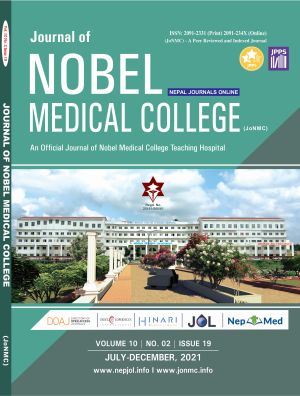Video Assisted Thoracoscopic Surgery in Exudative Pleural Effusion and its Complication Management: An Experience in a Community Hospital
DOI:
https://doi.org/10.3126/jonmc.v10i2.41568Keywords:
Pleural effusions, Video assisted thoracoscopic surgery, Tuberculosis, MalignancyAbstract
Background: Exudative pleural effusions are common presentation of pleural disease. Long standing pleural effusion might complicate with loculations and cortex formation. Video assisted thoracoscopic surgery can be a useful tool for the diagnosis and the management of the complications. The aim of the study is to determine the cause and treat the complications related to the exudative pleural effusions.
Materials and Methods: It is a retrospective analysis of prospectively collected data of all patients with exudative pleural effusions subjected to surgical management. Data were collected over a period of four years in a community hospital in Kathmandu.
Results: Of 38 patients who underwent Video assisted thoracoscopic surgery only 33 were eligible for analysis. Male to female ratio was 2.3:1 with male (23) dominance. Twenty six (78.8%) had lymphocyte predominance and 23 (69.7%) had Adenosine deaminase level of more than 40 International unit in pleural fluid analysis. In histopathological examination most common finding was granulomatous inflammation 13 (39.4%), 9 (27.3%) were malignancy and 9 (27.3%) were nonspecific chronic inflammation. Of malignancies adenocarcinoma 3 (9.09%) was the most common finding, mesothelioma 2(6.06%) and 4 (12.12%) other.
Conclusion: Video assisted thoracoscopic surgery has a role to play in diagnosis of exudative pleural effusions, particularly when there is dilemma in diagnosis. Video assisted thoracoscopic surgery definitely has a role in diagnosis and treatment of the complications related to pleural effusions.
Downloads
Downloads
Published
How to Cite
Issue
Section
License

This work is licensed under a Creative Commons Attribution 4.0 International License.
JoNMC applies the Creative Commons Attribution (CC BY) license to works we publish. Under this license, authors retain ownership of the copyright for their content, but they allow anyone to download, reuse, reprint, modify, distribute and/or copy the content as long as the original authors and source are cited.




